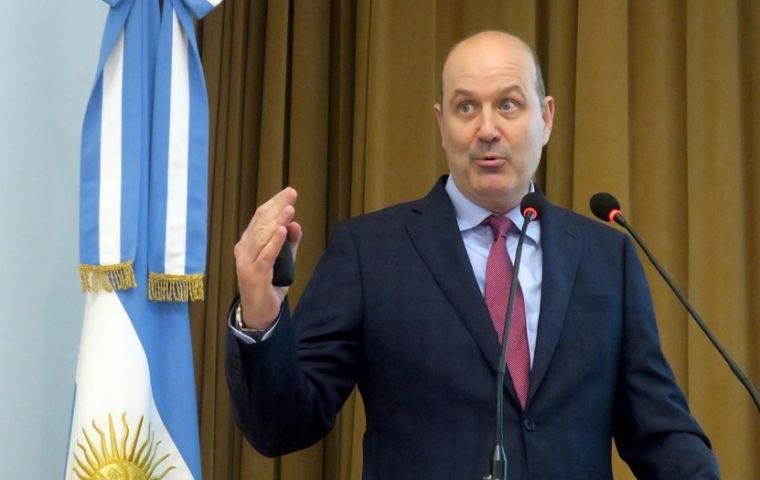MercoPress. South Atlantic News Agency
Dollar/Peso challenge: Argentina offers to swap one-month Lebacs for long term papers
 “It’s worthwhile to make a small effort to re-profile Lebacs to avoid having such a high concentration of maturities in the short term,” Federico Sturzenegger said
“It’s worthwhile to make a small effort to re-profile Lebacs to avoid having such a high concentration of maturities in the short term,” Federico Sturzenegger said  The central bank increased interest rates on its short-term Lebac securities to 40% from 26.3% in its monthly auction, last week.
The central bank increased interest rates on its short-term Lebac securities to 40% from 26.3% in its monthly auction, last week. Argentina’s central bank moved on Wednesday to improve its debt profile by offering to swap some of its one-month Lebac securities for paper of longer duration, the bank said in a statement.
If the swaps succeed in extending payments, which have obliged the bank to take a hard once-a-month blow to its reserves, the bond market may take the move as a needed financing improvement for a country ailing from high inflation and uncertainty about the stability of its peso currency.
“It’s worthwhile to make a small effort to re-profile the Lebacs to avoid having such a high concentration of maturities in the short term,” central bank chief Federico Sturzenegger said in an address to economists on Wednesday.
The central bank increased interest rates on its short-term Lebac securities to 40% from 26.3% in its monthly auction, last week. The monetary authority sold 620,930 billion pesos (US$ 25.77 billion) in Lebacs, compared with the 615,877 billion pesos’ worth of securities that matured.
The successful rollover of the Lebac notes was read by the markets as a much-needed sign of confidence in the financial system, sending the local Merval stock index higher.
The day of the rollover, May 15, has come to be known locally as “Super Tuesday” because it was seen as a turning point toward stability for local financial markets.
President Mauricio Macri recently made a conciliatory gesture toward bondholders by cutting Argentina’s 2018 fiscal target to 2.7% of GDP from 3.2%. His government is negotiating an International Monetary Fund ‘exceptional access’ standby deal.
Macri was elected in late 2015 on a pro-investment platform, but a recent flight from emerging markets hit Argentina particularly hard due to its weak fundamentals and high exposure to dollar-denominated indebtedness at a time of peso weakness.
The local currency has fallen 15.5% so far this month to 24.5 per U.S. dollar.
The central bank has jacked it key interest rate up to 40%, the highest monetary policy rate in the world, in a bid to keep the anemic peso from pushing inflation higher.
Consumer prices were 25.5% higher on a 12 month basis in April.
The Macri administration is holding a round of talks with main businesses and manufacturers to press for keeping bread basket prices from soaring in a country highly sensitive to the value of the greenback in the local money exchange market.




Top Comments
Disclaimer & comment rules-

-

Read all commentsLOL.
May 28th, 2018 - 06:08 pm 0This narrative has much akin to that of the Israelites wandering in the wilderness.
What exactly you may ask?
This: These corrupt, degenerates will never enter the economic promised land.
That will be reserved for a future generation - if at all.
Another success of Mauricio Macri and the 'best team in the last 50 years.'
May 24th, 2018 - 04:54 pm -3The move to sell mid-term debt instead of short-term debt is one more step into financial quagmire for Argentina--but not for members of the Macri team, banks and financial institutions which are making juicy gains each time the dollar climbs up.
The current Argentina government's only plan so far has been to borrow, then borrow some more, and lastly going to the IMF to still keep borrowing.
The current fiscal deficit the government “wants” to reduce is pretty much self-inflicted through the cancellation or steep reduction of export taxes on agri-food and mining products, as well as through the elimination of taxes on the wealthy.
In addition, there was never a plan to enhance the country's productive capacity, but just the opposite--opening wide the doors to imports is killing thousands of small and medium-size domestic business.
Argentina's next financial crisis is not longer in doubt--the only unknown is when it will happen.
Commenting for this story is now closed.
If you have a Facebook account, become a fan and comment on our Facebook Page!